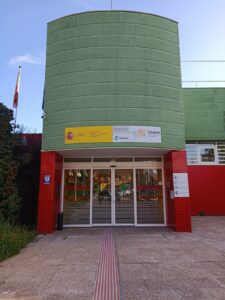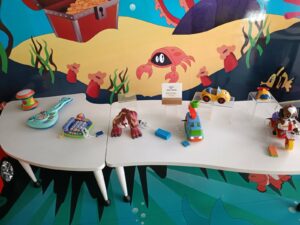
By Mariya Chubata for ReLAB-HS
In April 2022 Learning, Acting and Building for Rehabilitation in Health Systems (ReLAB-HS) Ukraine visited the State Reference Center of Autonomy and Assistive Technology (CEAPAT) in Madrid, Spain.
The purpose of the visits was to gain knowledge about types of assistive technology (AT), test AT, and learn how to check if AT corresponds to the World Health Organization’s Assistive Products Specifications (WHO APS). Furthermore, understanding how an AT Center works will help ReLAB-HS Ukraine to open similar centers in Ukraine. And establishing professional contacts with the administration can be helpful in the future for further sharing of experience and information.
 Members of the ReLAB-HS Ukraine team visited an assistive technology center in Spain. The center lets visitors test a variety of assistive products. Photo by ReLAB-HS Ukraine
Members of the ReLAB-HS Ukraine team visited an assistive technology center in Spain. The center lets visitors test a variety of assistive products. Photo by ReLAB-HS Ukraine
CEAPAT is a public reference and excellence center aiming to contribute to the rights of persons with disabilities and elderly persons through raising awareness about assistive technology (AT), accessibility, inclusive design, and stakeholders’ collaboration. CEAPAT guides people to the world of inclusivity, support, and equality.
During the visit, the ReLAB-HS Ukraine team had an opportunity to test assistive products for mobility, hearing, communication, cognition, self-care, and vision. Moreover, they were acquainted with universal design, accessibility, and home modification solutions. In addition, the team used the World Health Organization’s Assistive Products Specifications to understand if the demo products met assistive product specifications . This was an important exercise to improve knowledge about AT and draw attention to critical points important for future procurements.
 AT Center in Spain lets visitors test a variety of assistive products. Photo by ReLAB-HS Ukraine
AT Center in Spain lets visitors test a variety of assistive products. Photo by ReLAB-HS Ukraine
“I am impressed by a considerable number of AT gathered in one place for different purposes, but with one aim – to make people’s lives more inclusive and accessible. We need such AT centers in Ukraine as they will develop, maintain and promote the rights of people with disabilities and elderly persons,” a member from the ReLAB-HS team said.
The WHO estimates that the number of people with need of AT will double by 2030. Therefore, we need to respond to the current and future challenges, modernize the health system and make AT more accessible to people from different groups.
 AT Center in Spain lets visitors test a variety of assistive products. Photo by ReLAB-HS Ukraine
AT Center in Spain lets visitors test a variety of assistive products. Photo by ReLAB-HS Ukraine
In line with raising of the AT and rehabilitation services demand, ReLAB-HS team in Ukraine plans to support creation of an AT Regional center\ Hub – a center which will be created by Momentum Wheels for Humanity as a pilot model that could have a number of AT products and engage professionals. It can become a sustainable learning and training center. The AT Hub will help people learn about specific people’s needs and could become a part of the multicomponent clients’ pathway providing access to AT and ongoing professional support.